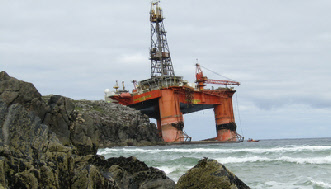A series of errors led to the grounding of an oil rig off the west coast of Lewis a probe has found.
Serious damage was sustained by the Transocean Winner after it broke its towline from a tug in a storm and crashed at Dalmore in August last year, causing a fuel spill.
Recovering the platform required a major salvage operation.
A worn towline, bad practices, lack of planning and failure to heed weather forecasts all contributed to things going wrong highlights the report.
Course was set too close to land, not enough sea room was allowed, no contingency plan was in place and there was a failure to identify places to run to for shelter.
The effect of high winds on the rig were not taken into account thus the captain’s had a misplaced confidence he could run ahead of the storm.
The tug MV ALP Forward was dragged backwards for over 24 hours. When the line broke her captain was completely helpless to stop the grounding concludes the investigation findings.
Severe weather blew up during the Winner’s voyage between Norway and Malta.
Winds gusting 67 mph and 17 metre seas would have been experienced at the peak of the storm says the report.
The tow way out at sea, steaming south 12 miles off the west side of St Kilda when the rig started meandering in the opposite direction. Drifting under the force of the strong winds, it pulled the tug northwards, missing the Flannan Isles but eventually curving onto a collision course with Dalmore.
► Video: Stricken Transocean Winner on Hawk
► Photos of the Transocean Winner oil rig over the Hawk
Sudden shock loads from the wild sea and high winds deteriorated the weakened and badly maintained line until it parted.
Even if the towline had not broken it “was very likely” that Transocean Winner would ground after the tug lost control.
“By the time the master realised that the tug and tow would not pass clear of the worsening weather, he had insufficient sea room to wait for it to pass,” states the report.
In his attempts to maintain control of the tow the tug captain placed too much strain on the tow line, “which ultimately led to its failure.”
Towing guidance led the master to prioritise keeping the line clear of the seabed. But that meant the tow wire was kept too short during the worst of the weather, resulting in it parting.
The report emphasised: “Had significantly more tow line been deployed, it is likely that the line would have suffered less damage from sudden loading, and it might not have failed.”
Instructions for towing in heavy weather demanded ballasting down the rig yet this was “impossible” on the unmanned platform. It is “unclear” why this was never questioned, says the findings.
Streaming behind the rig, the emergency tow line was of no use after it was caught underneath when the platform reversed course.
“Grounding was inevitable” highlights the report.
It added: “It was not possible for the emergency tow line to be recovered in the prevailing conditions and there was nothing ALP Forward’s master could do to resolve the situation once the main tow line had parted.”
Coastguard tug MV Herakles was in Orkney some 12 hours away.
However, supposing the emergency salvage vessel was on scene, it is “very unlikely” she would have been able to provide any practical assistance in maintaining control of the rig or preventing the grounding.
ALP Forward’s capabilities satisfied industry requirements but the master had insufficient information to predict that the tug would be unable to hold the rig in the forecast weather.
The “lack of essential information, instruction or guidance” in the towing manual meant he was not given sufficient information to manage his responsibility.
There was no commercial pressure to rush the voyage so it is “surprising” the sailing was not postponed given the bad forecast, said the report.
Owners and warranty surveyors ashore were not able to provide timely assistance due to ineffective monitoring of the daily reports, and the emergency towing arrangement was unsuitable for use in poor weather.
Weather forecasts and places of shelter were ignored when the voyage plan was assessed.
An improved maintenance and inspection routine could have kept the tow line in good condition or ensured it was replaced.
The drilling platform would have sank if it was not for a constant stream of air being pumped into some 27 holed tanks.
The oil rig was later transhipped on the back of a huge heavy lift ship to Turkey and chopped up for scrap.
► Video: Stricken Transocean Winner on Hawk
► Photos of the Transocean Winner oil rig over the Hawk

“Grounding inevitable” as oil rig out of control for 24 hours in wild seas before crashing on Lewis finds investigation
7 Sept 2017